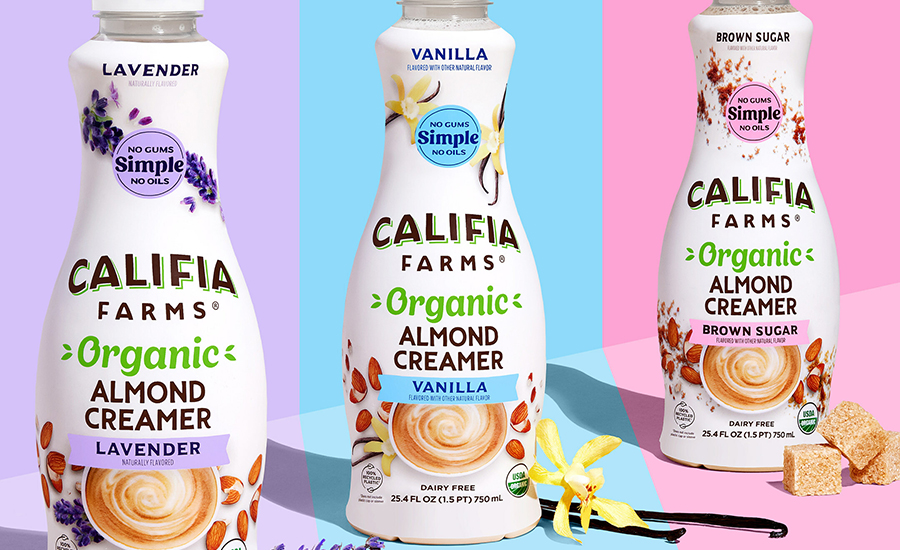Beverage-makers balance taste, quality with weight management
Consumers continue to value health and wellness, expecting multitude of benefits from beverages

Going into the New Year, many consumers may write resolutions. These resolutions are goals that range from spending less money, spending more time with loved ones or eating healthier. Health and wellness are common themes in resolutions, with folks aiming to take better care of themselves. One way to do so is through weight management.
Concerns surrounding obesity and other health-related issues have impacted products that support weight management, experts note.
“This heightened awareness has transformed consumer behavior, increasing demand for preventive health solutions and natural weight management products,” says Kash Rocheleau, CEO at Icon Foods, Portland, Ore. “The market has responded with significant innovation in clean-label solutions, natural ingredients and functional foods, mainly focusing on sugar reduction, fiber enrichment and protein fortification. Consumer preferences have shifted toward transparent, scientifically validated products that offer natural, sustainable solutions.”
Rocheleau adds that this consumer shift has led to “robust growth” across various sectors, especially in the food and beverage industry.
“The market now segments into health-conscious consumers seeking preventive solutions, individuals with medical necessities requiring specific interventions, and lifestyle-oriented customers looking for convenient, holistic wellness approaches,” she shares. “This trend shows no signs of slowing, with the market evolving toward more personalized, scientifically validated solutions that address immediate weight management needs and long-term health concerns.”
Denisse Colindres, senior manager of nutrition communication at BENEO, Parsippany, N.J., notes that obesity has been a global problem for decades.
Although developments have been made with GLP-1 drugs, she notes that such medications do not address the importance of nutritional gaps or lifestyle changes.
“Consumers of GLP-1 drugs are increasingly aware of the need for comprehensive weight management strategies that include healthy eating and exercise,” Colindres explains. “As a result, there is a growing interest in foods and beverages that support these lifestyle changes and help fill nutritional gaps. Products that offer a wide range of health benefits, such as those containing proven ingredients, are becoming more popular.”
Colindres suggests that beverage-makers can leverage these trends by using appealing claims on their packaging so it is easier for consumers to make healthier choices.
Driving innovation
Beverage-makers can support the trend of weight management in an array of approaches.
Steve Fink, vice president of marketing at Morristown, N.J.-based PLT Health Solutions, says that health consciousness is driving wild innovation within the beverage industry, from wellness shots and ready-to-drink (RTD) beverages to mocktails.
“Increasingly, consumers are looking for experiences they can feel and demonstrable results,” he notes. “To do this, we’ll need highly innovative, beverage-friendly ingredients backed by solid clinical science. In the past, functional beverages have included vitamins and minerals as primary components. Today, consumers are demanding more function from their functional beverages.”
However, Fink shares that clinical science-backed ingredients are lacking because many are not easy to formulate.
Regardless, beverages are convenient for weight management support. Bret Barhoover, category marketing manager for specialized nutrition at Cargill, Minnetonka, Minn., elaborates how beverages can support this need state.
“Beverages offer a convenient and delicious way for weight-conscious consumers to get the nutrients they need, while still keeping calorie counts in check,” he says. “Proteins have long been central to these formulations, supporting satiety and helping to maintain muscle mass, while zero-calorie sweeteners bring the sweet, without the sugar. As brands embrace the needs of consumers on a personal weight-loss journey, beverages are poised to address additional nutritional needs around reduced-sugar, high protein, hydration and more.”
Icon Foods’ Rocheleau states that the beverage industry has been pivotal in supporting health and weight management trends through extensive innovation and strategic reformulation.
“Manufacturers have implemented multiple approaches to create functional beverages that align with consumer health goals, starting with comprehensive sugar reduction strategies incorporating natural sweeteners like allulose, stevia and monk fruit alongside advanced sweetness modulation technologies,” she says. “Functional ingredients have become increasingly important and popular, with beverages now featuring protein fortification for satiety, fiber addition for gut health, collagen for skin benefits and pre/probiotics for digestive wellness.”
Beverages offer a convenient and delicious way for weight-conscious consumers to get the nutrients they need, while still keeping calorie counts in check.
Rocheleau also notes that the industry has responded to portion control demands with smaller package sizes, RTD options and single-serve formats. She says that innovations in clean label and hydration have helped diversify the market into several key categories, including functional waters and plant-based options, all offering various benefits while maintaining both convenience and taste.
“These innovations provide consumers with portable health solutions, measurable portion control, easy intake tracking and consistent nutrient delivery, positioning beverages as essential in supporting broader health and weight management goals,” Rocheleau says.
She adds that other trends beyond calorie reduction are shaping the weight management beverage landscape.
“Sustainability and environmental consciousness have become crucial drivers with the younger generations, with consumers demanding eco-friendly packaging, reduced carbon footprints and sustainable ingredient sourcing,” Rocheleau explains. “Mental wellness has emerged as a significant factor, leading to the incorporation of stress-reduction formulations, adaptogens and mood-supporting ingredients.”
Rocheleau also points to personalization and customization, with products tailored to specific demographics based on age, lifestyle, gender and time of day.
“Clean label demands remain paramount, emphasizing minimal ingredients, natural colors and flavors, and transparent sourcing,” she says. “Experiential elements have gained traction, with novel flavors, texture innovations and unique delivery formats creating memorable consumer interactions.”
Additionally, Rocheleau notes that convenience remains important, especially through RTD and on-the-go packaging formats. She also shares that a holistic health approach has become the standard, as consumers expect beverage-makers to incorporate factors like immune support or cognitive function benefits into their products.
“Social responsibility has become a key consideration, with consumers expecting Fair Trade ingredients, ethical sourcing and demonstrable community support,” Rocheleau adds. “These trends collectively drive product development and marketing strategies in the weight management beverage sector, requiring manufacturers to balance multiple consumer demands while maintaining product effectiveness and appeal.”
Shil Kothari, president of Fairfield, Calif.-based Gateway Health Alliances Inc., echoes similar sentiments, noting the company’s patented extracts, Dyglomera and CQR-300. In a clinical study, the two demonstrated a direct and significant increase in GLP-1 levels.
Like Rocheleau, Kothari points to trends like convenience, sustainability, multi-functional health benefits and prioritizing natural and plant-based solutions.
“Consumers are drawn to sustainably sourced and upcycled ingredients, aligning with broader environmental consciousness,” he says. “Both Dyglomera and CQR-300 are sustainably sourced, 100% traceable, vegan, GMO-free and extracted using water-based methods that ensure minimal environmental impact.”
Important ingredients
To support weight management attributes in beverages, beverage-makers are turning certain ingredients.
Vaughn DuBow, senior director of product portfolio marketing for health and wellness at Chicago-based ADM, shares that microbiome solutions specifically demonstrate “new avenues” for weight management support.
“For example, satiety is a crucial component in achieving weight management goals — including for consumers tapering or discontinuing use of GLP-1 treatments — and evidence suggests that prebiotic dietary fibers can help promote satiety,” he explains.
DuBow refers to ADM/Matsutani LLC’s Fibersol, a prebiotic dietary fiber that might delay hunger and stimulate appetite regulating hormones.
“Weight is directly influenced by metabolic health, and is also connected to heart health, blood sugar levels and cholesterol,” he says. “Incorporating Fibersol into beverages can also help reduce blood sugar levels after a meal that are within the normal range in healthy individuals. … Combining Fibersol with other biotics can further support metabolic health targets.”
DuBow notes that plant-based protein and botanical extracts also can support new beverage developments for weight management. Soy and pea proteins can aid in muscle health, while acerola powder, might support metabolic reactions in the body, he says.
Icon Foods’ Rocheleau also points to proteins, noting that a wide variety of functional ingredients can effectively support weight management in beverages.
“Protein sources, including whey isolate/concentrate, various plant proteins, collagen peptides and essential amino acids, play a crucial role in supporting satiety and lean muscle mass,” Rocheleau says. “Fiber components such as soluble tapioca fiber, inulin, FOS and beta-glucans aid in fullness and gut health while supporting blood sugar management.”
She notes that natural sweeteners and gut health ingredients also are popular.
“A standout ingredient for weight management formulations is RebM stevia, available in both conventional and organic options,” Rocheleau states. “RebM, one of the steviol glycosides from the stevia rebaudiana leaf, offers a cleaner taste profile with less bitterness, sourness and astringency compared to RebA, the most common steviol glycoside.”
Jennifer Berndt, marketing manager for beverages at Cargill, also notes stevia sweeteners proliferation.

“With the growing popularity of stevia-based sweeteners in weight management products, Cargill nutrition scientists partnered with leading researchers to conduct a clinical study designed to understand how stevia influences appetite, energy intake and blood glucose levels,” she shares. “The study found that consuming a stevia-sweetened beverage before a meal reduced appetite and energy intake, without raising blood glucose levels — all important factors for brands eyeing the weight management space.”
BENEO’s Colindres says the company has ingredients that can support the nutritional needs of those on GLP-1 or those starting their weight loss journey in many ways. Palatinose, BENEO’s alternative carbohydrate, is made from sugar beet and delivers full carbohydrate energy, she notes.
“Sucrose from beet sugar is converted to isomaltulose by a process of enzymatic rearrangement, leading to a different molecular linkage than in sucrose,” she explains. “As such, it is more stable and released at a slower rate to the body, causing lower impact on blood sugar levels and insulin release. Stable blood sugar levels are associated with a better energy status, improved cognitive functions, prolonged satiety and, hence, less cravings.
“Food manufacturers can use this slow-release sugar to replace sucrose in drinks,” Colindres continues. “Palatinose is also the preferred choice for sports nutrition, as it provides an optimized use of energy sources and increased fat burning.”
She says that another nutritional need for people on GLP-1s or looking to lose weight is hydration. Ingredients like Palatinose support superior hydration and thermoregulation, Colindres notes.
Chicory root prebiotic fibers increase feelings of fullness and reduce calorie intake as well, she adds.
“In addition, they contribute to a low glycemic diet by replacing available carbohydrates with dietary fiber, thus supporting effective blood sugar management,” Colindres says. “Additionally, due to their prebiotic effect, these fibers support the gut microbiome by nourishing the good, beneficial microorganisms … therefore, also support digestive health, well-being and immune health.”
Additionally, PLT’s Fink identifies the company’s Slendacor Weight Management Complex, a water-soluble form of a botanical complex.
“Slendacor is a synergistic, patented formulation of three standardized herbal extracts — turmeric, moringa and curry leaf — that was developed through an extensive botanical screening effort that had the goal of identifying herbs that impact weight loss,” he explains.
It was examined in multiple pre-clinical and human clinical trials.
“These studies have demonstrated that not only is Slendacor effective in promoting weight loss and body shaping, but [it] also accomplishes these in a healthy manner, improving overall cardio metabolic health,” Fink adds.
Beverage categories for weight management
Certain sectors in the beverage industry are more likely to use weight management ingredients than others.
“Ideally, the beverage categories include those that are consumed daily or nearly daily, as required by the daily serving regiments followed in clinical studies,” Gateway Health’s Kothari says.
He lists the following categories as ideal for weight management:
- Functional drinks, specifically those targeting health benefits, including metabolic support and appetite regulation.
- Meal replacements, including high-protein or fiber-rich beverages designed to substitute meals while managing caloric intake.
- Smoothies and shakes that are often marketed for satiety and convenience.
- Sports and energy drinks that are designed for both weight management and performance.
Thom King, chief innovations officer at Icon Foods, shares comparable insights.
“High-protein meal replacement drinks are among the most likely to incorporate weight management ingredients, providing a nutrient-dense option to support weight loss goals,” he says. “Additionally, sports and hydration drinks are a growing category, especially those focused on replenishing electrolytes and promoting hydration without added sugars.”
Cargill’s Berndt feels similarly, noting that nutritional shakes, protein drinks, and meal replacements are among the most popular weight management beverages.
“In part, it’s a numbers game,” she concludes. “On average, beyond water, Americans consume about four beverages daily — and that’s a number that’s been trending upward. It stands to reason that, as consumers increase their consumption of ready-to-drink beverages, they’ll pay more attention to added sugar levels, eschewing full-sugar drinks for options with a lighter calorie load.”
Weighing in on the future of weight management beverages
When it comes to weight management beverages, experts anticipate that market demand will continue to grow.
Vaughn DuBow, senior director for product portfolio marketing for health and wellness at ADM, Chicago, says that convenience and enjoyment are critical in terms of appealing to consumers seeking weight management support.
“Beverage applications can provide both, so we anticipate increased demand and innovation opportunity for beverages in this space,” he shares. “This is compounded by the ongoing research of the effects from different microbial strains and botanical extracts that can be added to beverage formulations, helping refine offerings with demonstrated results for weight management support. Plus, with the increasing use and awareness of [anti-obesity medications] (AOMs) from consumers, we anticipate the focus on weight management and ways for supplemental support through formats like energy drinks, teas and CSDs will accelerate in the year ahead.”
Shil Kothari, president of Fairfield, Calif.-based Gateway Health Alliances, predicts that consumer interest in weight management beverages will continue to rise.
He lists the following as contributing factors:
- Advances in ingredient science, offering multifunctional benefits (e.g., GLP-1 enhancement, appetite suppression).
- Increased consumer awareness and concern about obesity-related health risks.
- Growing demand for natural, plant-based alternatives to pharmaceuticals.
- Growing interest in sustainable and clean-label products.
- Expanding consumer base, including younger demographics seeking proactive health solutions.
“With proven ingredients like Dyglomera and CQR-300 demonstrating measurable benefits, the market for weight management beverages is likely to experience sustained growth,” Kothari says.
Thom King, chief innovations officer at Icon Foods, Portland, Ore., expects demand for weight management beverages to be huge, especially with the rise of GLP-1 agonists.
“People using GLP-1 agonists are looking for convenient, nutrient-dense options, and beverages fit perfectly into that category,” King says. “Hydration is another major focus. Managing electrolytes is critical for people losing weight, so beverages that offer no added sugar but still provide electrolytes will be key.”
He observes that many beverages in the current weight management sector are all about protein. These beverages target those who are trying to lose weight, but maintain muscle mass and avoid sarcopenia. King says fiber is important for those trying to lose weight as well.
“Beverages are a massive opportunity for this space,” he notes. “They provide convenience, hydration and targeted nutrition that consumers are looking for, and the demand is only going to keep growing.”
Denisse Colindres, senior marketing manager for nutrition communication at Parsippany, N.J.-based BENEO, shares that weight management beverages — and healthier beverages in general — have been an ongoing trend, especially as consumers become more aware of how healthier options significantly impact overall well-being.
“Some of the future key trends that consumers will demand might involve functional ingredients with proven benefits, a focus on natural ingredients, and personalized nutrition,” Colindres says. “BENEO helps manufacturers in their efforts to create innovative beverage products that support good health. When it comes to fighting obesity, it is not only about the availability of those products, but also continuous efforts by all involved — the food and beverage industry, but also nutritionists, medical professionals, and more — to demonstrate the impact of healthy choices.”
Bret Barhoover, category marketing manager for specialized nutrition at Cargill, Minnetonka, Minn., says that, given global health trends, the need for products that support wellness journeys “seems destined to continue to grow.”
“The added wrinkle for product developers may be a growing desire for products that offer additional health benefits,” he states. “Alongside protein fortification and sugar reduction, the next generation of weight management beverages may also offer gastrointestinal benefits, hydration support, and more.”
Another factor looming over such development, and the overall food and beverage segment, is taste, Barhoover adds.
“For these beverages to win big in the marketplace, they must deliver an enjoyable experience,” he shares. “Create a product that addresses a significant health need and also deliver on taste and enjoyment, and you’ve got a recipe for success.”
Looking for a reprint of this article?
From high-res PDFs to custom plaques, order your copy today!






